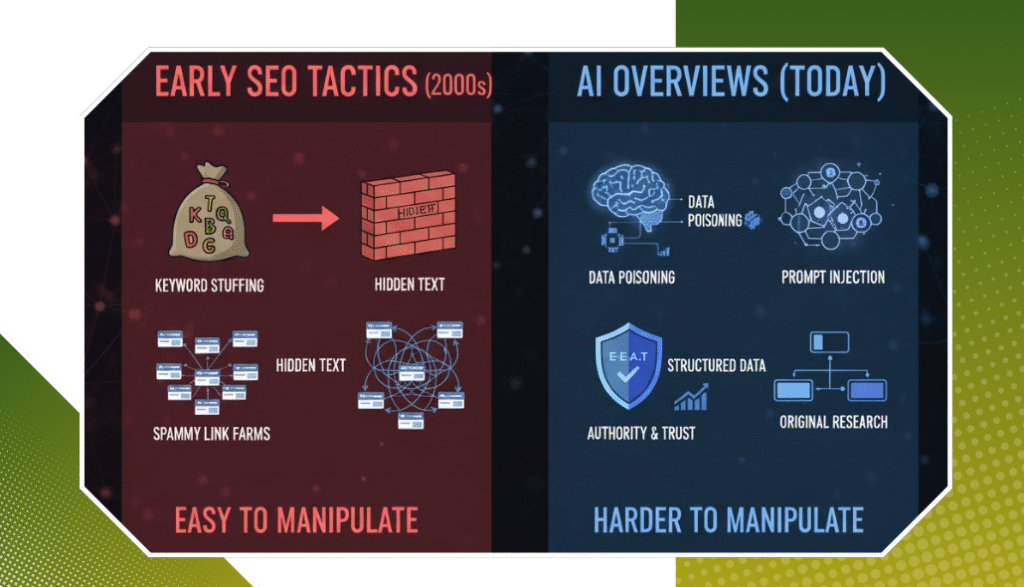This is where semantic and LSI (Latent Semantic Indexing) keywords come into play. They help search engines understand the full context of your content and show that your page is truly relevant to what users are searching for. In this blog, we will look at how AI helps you target semantic and LSI keywords efficiently.
Key Differences Between Semantic vs. LSI Keywords
While semantic and LSI keywords are often used together, they are not the same. Semantic keywords are broader and conceptually related to search intent and the meaning behind the words. For example, if your primary keyword is “apple,” semantic keywords could include “fruit,” “healthy snack,” or “nutrition.” These terms help Google figure out whether you are talking about the fruit or the tech company.
On the other hand, LSI keywords are words and phrases that frequently appear alongside your main keyword across many pages on the web. For example, if your target keyword is “digital marketing,” related latent semantic indexing keywords could be “SEO,” “social media,” “email campaigns,” and “online advertising.” Simply put, semantic keywords are broader and focus on the general idea, while LSI keywords are more concrete and specific contextually.
Limitations of Manual Keyword Research
Doing semantic keyword research manually can be a slow and tedious process. You might end up relying on synonyms, autocomplete, and spreadsheets. You can miss subtle connections between ideas. It is difficult to spot hidden patterns and nuances in search results.
It takes hours to comb through search results, and sometimes you will overlook related terms that could boost your content’s relevance. Google’s systems don’t just match exact words; they infer meaning from related concepts. Manually collecting related words often leaves gaps in your content. You might pick obvious synonyms, but miss terms that anchor your content naturally in its topical space.
Benefits of AI for Semantic Keywords
Using AI for semantic keyword research offers several advantages that go beyond traditional methods. Here is how AI SEO optimisation enhances this aspect of SEO:
- Improved Contextual Understanding: AI tools utilising Natural Language Processing (NLP) can go beyond the exact matches and grasp the nuances of language, identifying synonyms, related terms, and context-specific meanings. This capability ensures that your content aligns with how users naturally search, improving relevance and engagement.
- Efficient Keyword Clustering: Rather than manually sifting through lists of possible related terms, AI makes it easier to uncover a wide range of semantic keywords quickly. This saves you time by letting you focus on refining your content strategy instead of compiling data.
- Adaptability to Search Trends: AI-powered tools can monitor and adapt to evolving search trends and user behaviours in real-time. This adaptability ensures that your keyword strategy remains current and effective in a dynamic digital landscape.
Incorporating AI keyword research into your semantic keyword research can lead to more nuanced, scalable, and adaptable SEO strategies, aligning your content more closely with user intent and improving overall search performance.
AI-Driven LSI Keyword Identification
AI identifies LSI keywords by using artificial intelligence to discover related keywords that are semantically similar to a primary keyword, enhancing artificial intelligence search engine optimisation. This helps search engines understand the context & relevance of content beyond simple keyword matching, leading to improved search rankings and user experience. Here is how AI identifies LSI keywords:
- Vector Engines: AI models using vector engine analysis text to spot words and phrases that often appear together, suggesting a connection in meaning. These engines help identify terms that share similar contexts, even if they are not exact matches.
- Machine Learning: By processing large volumes of data, AI can recognise word relationships that might not be obvious at first. It goes beyond direct synonyms, learning how words work together in real-world language.
- Natural Language Processing (NLP): With NLP technologies, AI understands the nuances of language. It identifies not just words, but related ideas and topics, enabling it to discover concepts tied together in a natural way.
How to Use AI for Keyword Research
You don’t need to use every keyword. The goal is to cover the topic in a way that feels natural and complete. Here’s how you can practically use AI to improve your keyword research process:
- Start With a Seed Keyword: Input your primary keyword into an AI-powered tool like Surfer SEO, Clearscope, or even ChatGPT with web access.
- Get Context-Based Suggestions: Look at the semantic themes and related terms. These may include synonyms, FAQs, or related topics that reflect the user’s intent.
- Analyse SERPs: AI tools can break down top-ranking pages and show what related keywords appear consistently.
- Use Clusters, Not Just Single Terms: Group semantic and LSI keywords into topic clusters. This helps guide your content structure and supports topical authority.
- Optimise Naturally: Don’t force keywords. Let them guide the content instead of stuffing them in. AI-based content editors can suggest placements that read well and follow SEO best practices.
Conclusion
Incorporating semantic keywords and LSI keywords into your SEO strategy can greatly enhance your content’s contextual depth. By understanding user intent and the broader context of search queries, you can create more engaging and effective content.
With the right tools, it’s easier than ever to streamline keyword research, adapt to search trends, and make sure your content aligns with what people are searching for. At Rankingeek Marketing Agency, we specialise in crafting tailored SEO strategies that drive real results. Contact us today to learn how we can optimise your content and help you achieve sustained online success.




